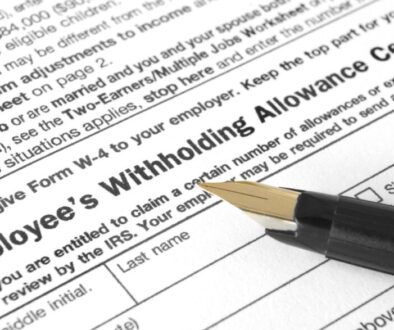Tax Tips for April
Table of Contents
It’s that time of the year again – tax season! April is just around the corner, and for many people, that means scrambling to get their tax returns filed on time. Whether you’re a business owner, a freelancer, or an individual taxpayer, navigating the complex world of taxes can be overwhelming, to say the least. But fear not! With a little bit of planning and preparation, you can make tax season a breeze. In this article, we’ll share some of our top tax tips for April, from maximizing deductions to avoiding common mistakes. So grab a cup of coffee, sit back, and let’s get started!
Understanding the April tax deadline
The April tax deadline is fast approaching, which means it’s time to get your financial affairs in order. Failing to file your tax return on time can result in hefty penalties and interest charges, so it’s important to stay on top of things. The deadline to file your federal income tax return is April 15th, although this may vary depending on your state of residence. If you’re unable to file your return by the deadline, you can request an extension by filing Form 4868. This will give you an additional six months to file your return, but it won’t give you more time to pay any taxes owed.
To avoid last-minute panic, it’s a good idea to start preparing your tax return as early as possible. Gather all your financial documents, such as W-2s, 1099s, and receipts for deductible expenses. You’ll also need to decide whether to file your taxes electronically or by mail. Electronic filing is generally faster and more convenient, but it may not be an option if you have a complicated return or need to file certain forms by mail.
Don’t forget to double-check your return for accuracy and completeness before submitting it. Errors and omissions can delay the processing of your return and potentially trigger an audit. If you’re unsure about something, don’t hesitate to seek professional advice from a tax preparer or accountant.
Tax deductions and credits to consider
One of the best ways to reduce your tax liability is to take advantage of tax deductions and credits. Deductions are expenses that you can subtract from your taxable income, while credits are dollar-for-dollar reductions in your tax bill. Here are some deductions and credits to consider:
- Charitable donations: If you made donations to a qualified charitable organization during the year, you may be able to deduct the amount on your tax return. Keep in mind that there are limits to how much you can deduct based on your income level.
- Home office expenses: If you work from home, you may be able to deduct a portion of your home expenses, such as rent, utilities, and internet costs, as a business expense. However, there are strict rules about what qualifies as a home office, so be sure to consult with a tax professional.
- Medical expenses: If you had high medical expenses during the year, you may be able to deduct them on your tax return. However, you can only deduct expenses that exceed a certain percentage of your income.
- Education credits: If you or your dependents paid for qualified education expenses, such as tuition and fees, you may be eligible for education credits such as the American Opportunity Tax Credit or the Lifetime Learning Credit.
- Child tax credit: If you have dependent children under the age of 17, you may be eligible for the child tax credit, which can reduce your tax bill by up to $2,000 per child.
Remember, deductions and credits are only available if you meet certain criteria, so be sure to read the instructions carefully and consult with a tax professional if you’re unsure.
Common tax mistakes to avoid
Making mistakes on your tax return can be costly, both in terms of penalties and missed opportunities for deductions and credits. Here are some common tax mistakes to avoid:
- Math errors: Simple math errors can cause your tax return to be rejected or delayed. Be sure to double-check your calculations and use the correct figures.
- Forgetting to sign your return: This may seem like a no-brainer, but forgetting to sign your tax return can result in it being rejected. Make sure to sign and date your return, and include your social security number.
- Failing to report all income: It’s important to report all sources of income on your tax return, including income from side gigs or freelance work. Failing to do so can result in penalties and interest charges.
- Claiming incorrect deductions or credits: Be sure to read the instructions carefully and only claim deductions and credits that you’re eligible for. Claiming incorrect deductions or credits can trigger an audit or result in penalties.
- Missing the deadline: Failing to file your tax return on time can result in penalties and interest charges, so it’s important to stay on top of things.
By avoiding these common mistakes, you can ensure that your tax return is processed quickly and accurately.
Maximizing your tax refund
Who doesn’t love a big tax refund? Here are some tips for maximizing your refund:
- Contribute to a retirement account: Contributions to a traditional IRA or 401(k) can reduce your taxable income and increase your refund.
- Take advantage of deductions and credits: As mentioned earlier, deductions and credits can reduce your tax liability and increase your refund.
- File electronically: Electronic filing is generally faster and more accurate than filing by mail, which can result in a faster refund.
- Claim all dependents: Be sure to claim all dependents on your tax return, as this can increase your refund.
- Review your return for missed deductions: It’s possible that you missed some deductions or credits when preparing your return. Review it carefully to see if there’s anything you missed.
Remember, a big refund means you’ve overpaid your taxes throughout the year. While it may be tempting to splurge on something fun, it’s important to use your refund wisely, such as paying down debt or saving for the future.
Tips for self-employed individuals
If you’re self-employed, tax season can be particularly tricky. Here are some tips to help you navigate it:
- Keep detailed records: As a self-employed individual, you’ll need to keep detailed records of your income and expenses throughout the year. This will make it easier to prepare your tax return and ensure that you’re claiming all eligible deductions.
- Pay estimated taxes: Unlike employees, self-employed individuals are responsible for paying their own taxes throughout the year. Be sure to pay estimated taxes quarterly to avoid penalties and interest charges.
- Take advantage of deductions: Self-employed individuals are eligible for a variety of deductions, such as home office expenses, business travel, and equipment purchases.
- Consider incorporating: Depending on your business structure and income level, incorporating your business may provide tax benefits and liability protection.
Remember, taxes can be particularly complex for self-employed individuals, so it’s important to seek professional advice if you’re unsure about anything.
How to file for an extension
If you’re unable to file your tax return by the April deadline, you can request an extension by filing Form 4868. This will give you an additional six months to file your return, but it won’t give you more time to pay any taxes owed. Keep in mind that you’ll need to estimate your tax liability and pay any taxes owed by the April deadline to avoid penalties and interest charges.
Filing for an extension can be a good option if you need more time to gather your financial documents or if you’re experiencing a hardship. However, it’s important to remember that an extension doesn’t mean you can procrastinate indefinitely. Use the extra time wisely and make a plan to file your return as soon as possible.
Resources for tax assistance
If you’re feeling overwhelmed by the tax preparation process, don’t worry – there are plenty of resources available to help you. Here are a few:
- IRS Free File: The IRS offers free tax preparation software for individuals with an income of $72,000 or less. This software can help you prepare and file your federal tax return quickly and accurately.
- Volunteer Income Tax Assistance (VITA): VITA is a program that provides free tax preparation assistance to individuals with an income of $57,000 or less. Trained volunteers can help you prepare your tax return and ensure that you’re claiming all eligible deductions and credits.
- Tax professionals: If you have a complicated tax situation or just prefer to have someone else handle your taxes, consider hiring a tax professional, such as a CPA or enrolled agent. They can provide personalized advice and help you navigate the tax code.
Remember, these resources are available to help you, so don’t hesitate to use them if you need assistance.
Changes to tax laws in 2021
Tax laws are constantly changing, and 2021 is no exception. Here are some of the key changes to be aware of:
- Stimulus payments: If you received a stimulus payment in 2020, it won’t be included in your taxable income for the year.
- Higher standard deduction: The standard deduction for 2021 has increased to $12,550 for individuals and $25,100 for married couples filing jointly.
- Changes to retirement account contributions: The contribution limits for traditional and Roth IRAs have remained the same for 2021, but the income limits for eligibility have increased.
- Changes to business deductions: The Tax Cuts and Jobs Act (TCJA) made significant changes to business deductions, including changes to the deduction for business meals and entertainment expenses.
Be sure to familiarize yourself with these changes and how they may impact your tax return.
Conclusion and next steps
Tax season can be stressful, but with a little bit of planning and preparation, you can make it a lot easier. From understanding the April tax deadline to maximizing your tax refund, there are plenty of things you can do to ensure a smooth tax season. If you’re feeling overwhelmed or unsure about anything, don’t hesitate to seek professional advice. And remember, taxes are an important part of your financial life, so make sure you’re taking them seriously and staying on top of things. Happy tax season!
Get tax tips delivered to your inbox:




